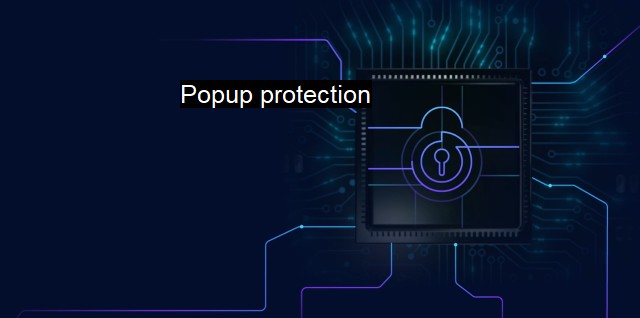What is Popup protection?
Popup Protection: A Necessity for Safe and Secure Online Browsing
Popup protection operates under the domain of cybersecurity and revolves around safeguarding computer systems and networks against intrusive and destabilizing popups. Originating mainly from internet browsers and arbitrary applications, pop-ups are typically nuisances coming in the form of out of turn digital ads. Unwanted and highly disruptive, they quite often play a role more sinister than merely bruising the user experience.These seemingly harmless digital disruptions often serve as gateways to larger, more disruptive cybersecurity problems such as phishing and malware, transforming the provision of popup protection into an integral part of antivirus solutions. Popup protection employs restrictive browser settings, algorithms, and software to detect popups and prevent them from manifesting into an annoyance, or more acutely recognized, a potential threat.
Interestingly, 'good code gone bad,' aptly describes these pesky infiltrators known as "popups". Originally devised to help provide additional functional latitude to programs and online interactions, some misguided souls equipped them with links to unwelcomed destinations such as viruses, worms and ransomware.
Thus began the cyber duel between illegal infiltration and data protection. popup protection is not just restricting unwanted advertisements. It also plays a role in denying some popups that disguise as 'friendly URL destinations' from potentially penetrating deeper into the user's system. It has to complete this task tactically – this involves understanding the popup's construction, determining if it is data-heavy, layered with adware, replete with malware or more insidiously, whether it shelters ransomware.
Preventing click-through redirections which camouflages scams within pop-ups is also a function of popup protection. Some sophisticated scams utilize ‘bait and click’ schemes that masquerade as genuine pop-ups, serving intriguing offers to entice users to click and voluntarily initiate the download of malevolent files.
Antivirus software often includes popup protection in its comprehensive suite of protections. These software systems bank upon data interception and behavioral analysis to identify and mitigate possible harms from the onset. By combining decentralized data retrieved from global dashboards, antivirus software can identify familiar stratagems and odd execution deviations that identify popup threats.
Regular updates and a systematic perusal of the continually evolving threat patterns permit these software systems to stay abreast of the latest duplicity launched by cyber fraudsters. These provisions arm the antivirus software to promptly recognize patterns and curb the damaging outcome of familiarity with unusual programming routines that present as popups.
User vigilance plays an equally essential role in popup protection. Users should abstain from closing such pop-ups by clicking on conspicuous Cancel or Close tabs, owing to the probability of such clicks instigating malware installation. The prescribed closure procedure includes using the assigned shortcut keys or maneuvering towards the task manager to manually eliminate the popup.
One must know that pop-ups are not always harmful – many serve legitimate, functional purposes that can enrich their online experience. Numerous authentic applications employ pop-ups as a convenient way to interact with users, providing context for specific account-related information or policy banners. Users and protective software need to discern these distinctions to continue enjoying these supportive pop-up instances.
Summarily, due to the vulnerable exposure that these pop-ups pose – where risks range from basic annoyances to far-reaching digital calamities, popup protection transforms this element of cybersecurity into an imperative dossier responsive to various cyber threats. Popup protection keeps evolving – continuously identifying and rectifying potential fallacies to ensure that both user experience and the latent data privacy arena remain pristinely poised against any undesirable intrusion.

Popup protection FAQs
What is popup protection in cybersecurity?
Popup protection refers to the measure put in place to prevent pop-ups from appearing on your computer when you access websites online. The feature is part of antivirus software, which detects and blocks pop-ups that come from malicious websites or applications from affecting your computer, protecting your data and personal information.How does popup protection work?
Popup protection is a feature found in antivirus software. This feature blocks pop-ups that arise from potentially dangerous websites or applications when a user is online, by analyzing the pop-up before it appears on the user's screen, and blocking it if it matches known patterns of malicious activity.Why is popup protection important for computer security?
Popup protection plays a vital role in computer security by putting in a measure to prevent malicious websites or applications from infecting your computer with malware. Pop-ups can also contain phishing links that trick users into revealing confidential information. Popup protection helps prevent these attacks, keeping your data safe from being stolen or hacked.How can I ensure that my popup protection is working?
Ensure that you have a reputable antivirus program running on your device. Most antivirus software has popup protection as a feature, and you should make sure that this feature is activated. You can also test your antivirus popup protection by visiting websites that tend to display pop-ups, and see if the antivirus software blocks these pop-ups.| | A | | | B | | | C | | | D | | | E | | | F | | | G | | | H | | | I | | | J | | | K | | | L | | | M | |
| | N | | | O | | | P | | | Q | | | R | | | S | | | T | | | U | | | V | | | W | | | X | | | Y | | | Z | |
| | 1 | | | 2 | | | 3 | | | 4 | | | 7 | | | 8 | | |||||||